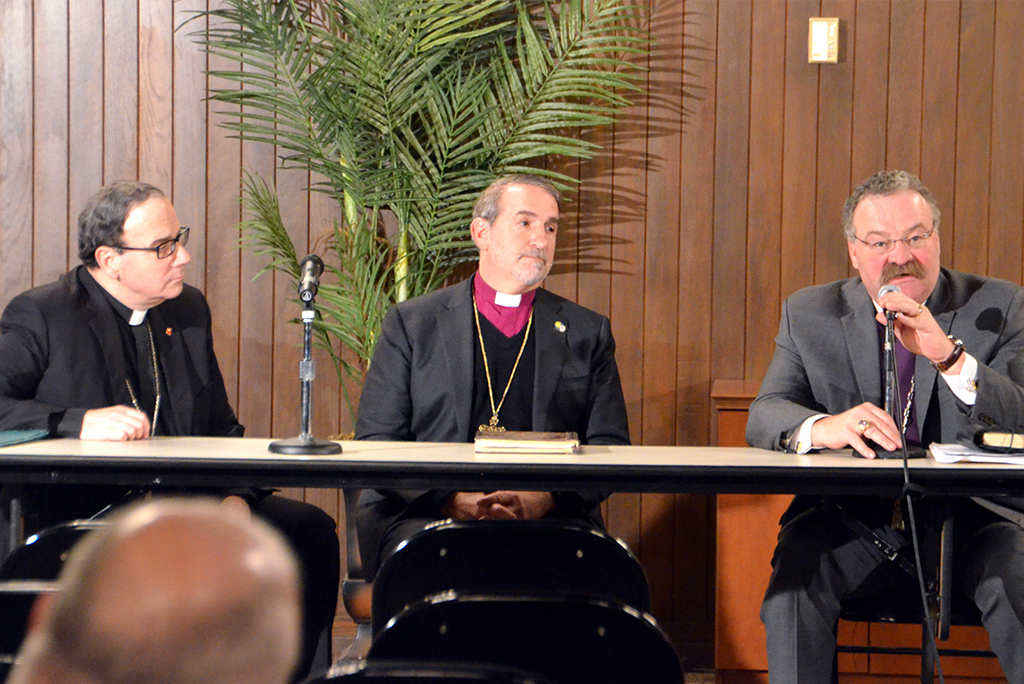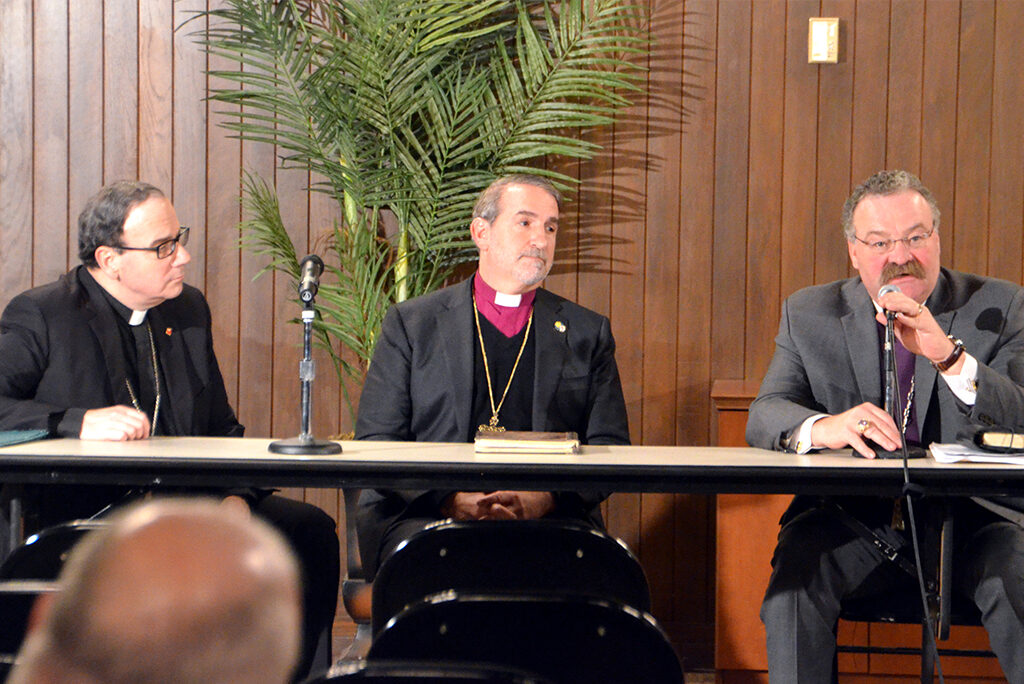
By Roger Drinnon
In the face of rising secularism and the declining influence of Christianity across the continent, presidents of three North American church bodies addressed increasing governmental encroachments on the free exercise of religion during a Feb. 8 Faith and Freedom Forum at Concordia Seminary, St. Louis.
Anglican Church in North America (ACNA) Archbishop Rev. Dr. Foley Beach, Lutheran Church—Canada (LCC) President Rev. Dr. Robert Bugbee and Lutheran Church—Missouri Synod President Rev. Dr. Matthew C. Harrison each spoke about the respective challenges the three churches face as government institutions codify laws that undermine traditional marriage, devalue human life and restrict expression of Christian faith in the public square.
Harrison began by explaining the ideal relationship between church and state, as intended by America’s Founding Fathers.
Natural law, reason and the Ten Commandments
“When natural law or reason is functioning properly, it agrees with the Ten Commandments … Our [nation’s] founders recognized that Christian morality agreed with reason and natural law,” said Harrison. “Our founders had a view of the relationship between church and state that was much closer to Luther than to that of modern secularists. The church served the state by providing moral, charitable and decent people. The state served the church by providing peace and order — the context in which religious [institutions would] prosper. [In this context] the state is not to legislate matters of religious conscience; the church is not to meddle in the affairs of the state.”
“The founders and [early] leaders of this nation not only believed in God but sought to create a nation based on the ethical and sociological foundation of the Ten Commandments,” said Beach. “They understood the words of Proverbs 14:34: ‘Righteousness exalts a nation, but sin is a reproach to any people.’ They had seen the miraculous events of the American Revolution and the obvious hand of God in the founding of this nation — that’s why our nation’s motto became ‘In God We Trust.’ ”
Harrison said that over time the relationship between church and state was tainted first by some churches’ intervening inappropriately in government affairs, then in recent decades by governments increasingly muting the Christian voice in the public square and by government legislating against natural law and reason. He said as Christian institutions stand by biblical principles, they now face numerous lawsuits on issues of life and marriage. Depending on the outcome of these cases — several of which will be heard by the U.S. Supreme Court later this year — some church institutions could lose their tax-exempt status, some Christian universities could lose accreditation and eligibility for students to receive federal loans, and some nonprofit institutions could be forced to pay for employee abortifacients as currently required under the Affordable Care Act.
Bugbee said challenges for Lutherans in Canada mirror those of Lutherans in the U.S., and there are increasing pressures to de-Christianize Canadian academic institutions, including a demeaning stigmatization of graduates from certain Christian colleges.
“The strong clash between secular ideologies and the free practice of the Christian faith is no longer some remote worry, located way off in the distance. In concrete ways, it is hitting us right now,” said Bugbee. “Christian churches and their pastors will need to think with the mind of Christ to diagnose such threats for what they are and also to figure out effective responses to them, both in congregations as a whole, and for the lives of individual believers.”
The Two Kingdoms
Harrison provided insight into Luther’s “Two Kingdoms” doctrine, explaining when it becomes necessary for Lutherans to engage in government matters by exercising their civic rights and responsibilities and by preaching the Word of God to the nation’s leaders:
“What is the proper distinction between what is due to ‘Caesar’ and what is due to God [Matt. 22:21]? Luther’s view is unique,” he said. “Luther asserted that the conscience, the religious convictions of the Christian belong to God … The Bible teaches two realms. The right-hand kingdom is that of the Church. In this kingdom, there is to be no coercion, no force, no corporal punishment. It’s the kingdom most solely [established] by the Word of God in service to the Gospel of Christ.
“The left-hand kingdom is temporal government,” he continued. “This kingdom, too, is established by God. This kingdom [normally] operates by reason and natural law. The temporal government is established by God for maintaining good order, for peace and to thwart evil. When government forbids the Gospel, however, or commands us to act against the Christian conscience, then ‘we must obey God rather than men’ [Acts 5:29].”
As some Lutherans might struggle to grasp how to apply this doctrine, the staff of the Synod’s Commission on Theology and Church Relations (CTCR) offered more clarification apart from the forum, while echoing Harrison’s comments.
“One God rules the world [1 Tim. 1:17], but in two different ways in two different ‘realms.’ This twofold reality produces tensions for the Christian that are not easily resolved,” said the Rev. Larry Vogel, associate executive director of the CTCR, who also facilitated the forum.
“In His ‘kingdom of grace,’ where Christ reigns, He uses His Word and Sacraments to bring people to faith without coercion and to glad acceptance of His rule and authority [see John 3:3; 18:36; Col. 1:13-14; 2 Peter 1:11]. In His ‘kingdom of power,’ His temporal or earthly kingdom, God uses governments to maintain order, stability and justice in this sinful, imperfect world [see Rom. 13:1-5; 1 Peter 2:13-14, 17]” he continued. “Thus, Jesus Himself tells us to render to Caesar and to God [Matt. 22:21]. And, even as Christians honor and obey governing authorities, they must boldly disobey government when it usurps God’s authority [Acts 5:29].”
Vogel said just as Christians respect human authority, they are also free to engage with government to prevent governments from acting unjustly.
Don’t be discouraged
Seminary faculty and students, as well as clergy from various churches in the St. Louis area and southwestern Illinois, attended the event. After each president spoke at the forum, they together fielded questions from participants during a panel discussion. That discussion culminated in a first-year seminarian asking for “words of encouragement and hope for those about to take up the cross.”
“I’m tremendously hopeful for our young pastors,” replied Bugbee. “We cannot recreate [the past], but good parish pastors will endure — do not let the evil one convince you otherwise.”
Beach cited Joshua 1:9: “Have I not commanded you? Be strong and courageous. Do not be frightened, and do not be dismayed, for the Lord your God is with you.”
“Take that with you wherever you go,” said Beach.
“You are equipped for this moment, so rock-n-roll!” said Harrison. “You will suffer, but you will become the pastor you need to be — don’t be discouraged.”
The forum was held in conjunction with the church leaders’ meeting in St. Louis Feb. 8-9 for the first of two planned discussions this year to consider on the basis of Holy Scripture points of agreement and disagreement among their churches. To read more about this meeting, visit reporter.lcms.org/2016/discussions-encourage-lutheran-anglican-leaders.
Roger Drinnon (roger.drinnon@lcms.org) is manager of Editorial Services for LCMS Communications.
Posted Feb. 25, 2016
